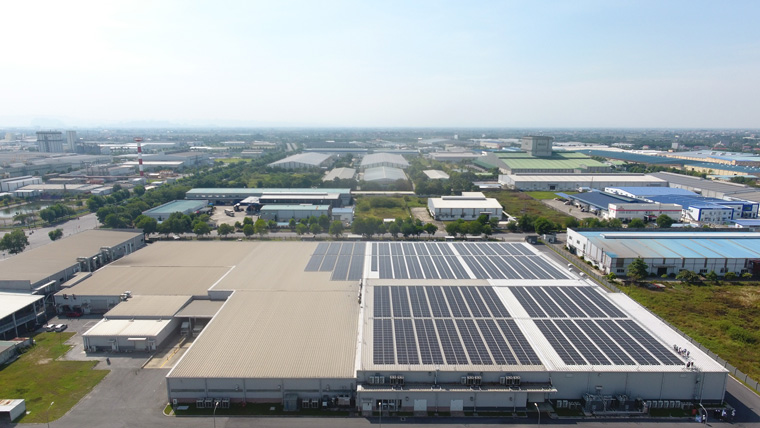Promotion of CSR
Responding to Climate Change
Basic Approach
The Yokowo Group is committed to climate action, selecting "Environment" as one of its material issues (materiality) and also setting a target for reducing greenhouse gas (GHG) emissions (Scope 1 & 2)*1 in its Environmental Policy and Action Guidelines.
The Group discloses these concrete measures and progress in their implementation in the CDP (Carbon Disclosure Project) framework, and will also put more effort into reducing Scope 3 greenhouse gas emissions in the future.
The Yokowo Group has used third-party assurance services to validate its total GHG emissions data since FY2019, and has disclosed its total GHG emissions and climate change initiatives to CDP since FY2017. Going forward, the Group will continue strongly promoting action on climate change in pursuit of achieving carbon neutrality by 2050 and will continue contributing to the development of society through its business activities.
*1 Reducing greenhouse gas emissions from its own plants (Scope 1 & 2) by 35% by FY2030, compared to FY2014
Response to the TCFD Recommendations
The Yokowo Group's Board of Directors decided to declare support for the recommendations of the Task Force on Climate-related Financial Disclosures (TCFD) in October 2021. Under the CDP framework, the Group discloses information in the areas of governance, strategy, risk management and metrics & targets, which are the core elements of the TCFD recommended climate-related financial disclosures.
Governance
The Yokowo Group has strengthened governance systems in response to climate change and, when making decisions on climate change-related investments, Yokowo's Board of Directors assesses the business opportunities and risks involved and exercises rational judgment. The Representative Director has approved a Basic Policy on Material Issues (Materiality), which include climate action, and the injection of resources for environmental measures, and is responsible for overseeing action on climate change.
Evaluation of performance on climate-related initiatives has already been incorporated into standards for determining the compensation of directors and executive officers, and the Representative Director (President) assesses performance and then refers the matter to the Nomination & Compensation Advisory Committee (which consists of a majority of independent outside directors). The independent outside director who chairs the Nomination & Compensation Advisory Committee reports a proposal determined through deliberation by the committee to the Board of Directors and the Board of Directors makes a final decision.
Additionally, in October 2022, Yokowo established the Sustainability Committee as an organization which comprehensively focuses on the three material issues (the environment, local communities, and diversity and inclusion) identified by the Group.
The Sustainability Committee is chaired by the President and Executive Officer and composed of the Senior Managing Executive Officer and Managing Executive Officers as members and the full-time Audit & Supervisory Board Member and Outside Directors as observers.
The Sustainability Committee determines material issues (materiality), which include climate action, and policies for achieving targets on the issues to be addressed, and it is also responsible for systems for reporting to and sharing information with the Board of Directors on the status of sustainability-related initiatives of the Yokowo Group.
Sustainability Committee Framework
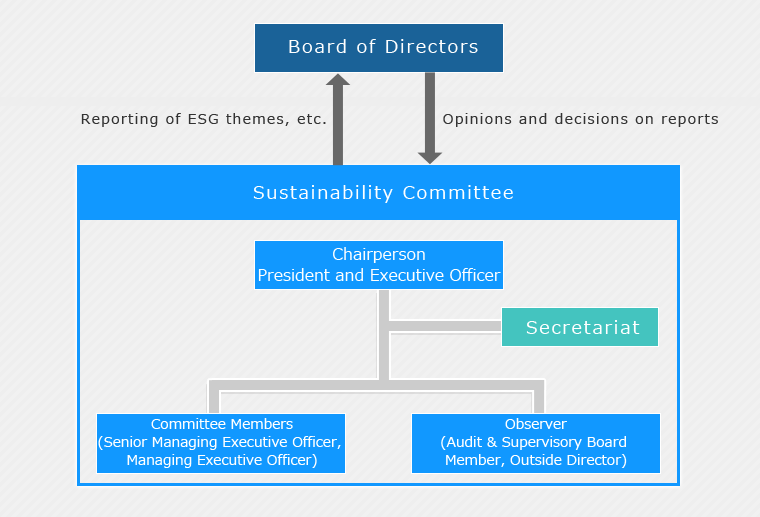
Strategy
- Scenario Analysis
- Yokowo conducted a scenario analysis based on the Group's three segments (Vehicle Communication Equipment, Circuit Testing Connector and Personal Communication Equipment), to identify and evaluate climate-related risks and opportunities and understand the medium- to long-term impact of climate-related challenges on businesses. For the analysis, Yokowo used a scenario which anticipates a global temperature increase of 3℃ compared to pre-industrial revolution by 2100 as well as a scenario which anticipates that the global temperature increase is kept below 1.5℃, and analyzed transition risks and opportunities as well as material changes due to disasters, etc. (material risks and opportunities).
- Impact on the Yokowo Group's Businesses
| Strategies and areas impacted | Explanation of impact |
|---|---|
| Products and services | The main products and services provided by the Yokowo Group are manufactured and sold across three segments (Vehicle Communication Equipment, Circuit Testing Connector and Personal Communication Equipment). Design and manufacturing make up the bulk of the Group's business activities in the manufacturing industry, and activities to reduce GHG emissions in the manufacturing phase, which is associated with considerable GHG emissions, are important. Going forward, the Group will definitely be required to reduce GHG emissions considerably through tighter regulations and other measures in accordance with the Japanese national policy for the Paris Agreement in 2015 and the 2050 Carbon Neutrality Declaration of the Japanese government in October 2020. The Group will also need to develop and market products with lower GHG emissions, and enhancement of the Group's ability to propose technologies and competitiveness is key. |
| Supply chains and/or value chains | Broadly speaking, the Yokowo Group's supply chains and value chains have to do with either the production and procurement of materials (raw materials secondary products, etc.) for products or production at the Group's own manufacturing plants. The national policy for the 2015 Paris Agreement also indicates 2030 emission goals by sector, with materials production and production plants falling under production departments, so the Group needs to make reductions for these. More concretely, measures to reduce greenhouse gas emissions to fight climate change are expected to increase costs through the levying of carbon taxes and additional equipment investments as regulations are strengthened to keep down emissions during materials production and product manufacturing. |
| R&D investment | The Yokowo Group aims to constantly develop and supply cutting-edge products in all three segments (Vehicle Communication Equipment, Circuit Testing Connector and Personal Communication Equipment), and the development of technologies and R&D are extremely important for business growth. The Group has to reduce GHG emissions in accordance with the national policy in the 2015 Paris Agreement as well as other laws and regulations, which also means it is essential to develop and possess technologies to achieve such reductions. More specifically, the development of technologies for carbon neutral production and carbon neutral products are issues which need to be addressed. |
| Operation | In the Vehicle Communication Equipment and Circuit Testing Connector and Personal Communication Equipment businesses, which are the Yokowo Group's core businesses, production processes at plants are major sources of GHG emissions and the societal trend towards decarbonization poses various operational risks and opportunities, including carbon taxes, renewable energy introduction and pricing. In light of such risks and opportunities, the Group is implementing specific measures with the target of reducing greenhouse gas emissions from its own plants (Scope 1 & 2) by 35% by FY2030, compared to FY2014, and the reduction of emissions associated with plant operations is an important issue to be addressed. |
| Elements of financial plans impacted | Explanation of impact |
|---|---|
| Assets | The results of scenario analysis indicated that assets will be impacted, with higher prices for transactions due to the need for enhanced energy saving performance on the construction of new buildings or the selection of offices based on recognition of the urgency of complying with low-carbon and decarbonization requirements. Other assets such as production facilities and their ancillary facilities, plant infrastructure and equipment and company cars (BEVs, HEVs, rapid chargers) will also be similarly impacted. |
Risk Management
The Yokowo Group conducts business across three segments (Vehicle Communication Equipment, Circuit Testing Connector and Personal Communication Equipment) and has identified risks and opportunities related to its corporate activities and actions, including climate change, in all three segments and quantifies and manages the impact of such risks and opportunities.
The identification and evaluation of climate-related risks is part of the operations of Environmental Management Committee meetings organized by the Sustainability Promotion Department and evaluations are conducted on a regular basis every year and on an ad hoc basis whenever necessary. For each division that makes up the Environmental Management Committee, climate-related risks arising from their respective business processes are identified and evaluated and the secretariat of the committee then integrates risks to identify enterprise risks, which are approved by the General Manager of the Sustainability Promotion Department and the officer in charge of the Environment, before being reported to the Board of Directors as enterprise risks.
Targets
The Yokowo Group has set itself a target of reducing greenhouse gas (GHG) emissions (Scope 1 & 2) by 35% by FY2030, compared to FY2014, in pursuit of the achievement of carbon neutrality by 2050.
Going forward, the Yokowo Group will continue to accelerate initiatives for achievement of the target, focusing on areas such as expansion in the share of electricity generated from renewable energy, reduction of energy intensity, introduction of renewable energy self-consumption systems, and green energy procurement, and the Group will also put more effort into reducing Scope 3 greenhouse gas emissions.
(For a breakdown of GHG emissions by category, please refer to the Group's ESG Data)
| GHG Emissions (Unit : t-CO2) |
Period | ||
|---|---|---|---|
| FY2014 (Results) | FY2022 (Results) | FY2030 (Target) | |
| Scope1 | 402 | 578 | 35% reduction from FY 2014 (Scope1・Scope2) |
| Scope2 | 18,009 | 21,274 | |
| Scope3 | - | 358,603 | |
| Total emissions (Scope1・Scope2) |
18,411 | 21,853 | |
Data
- GHG Emissions and Emission Factor
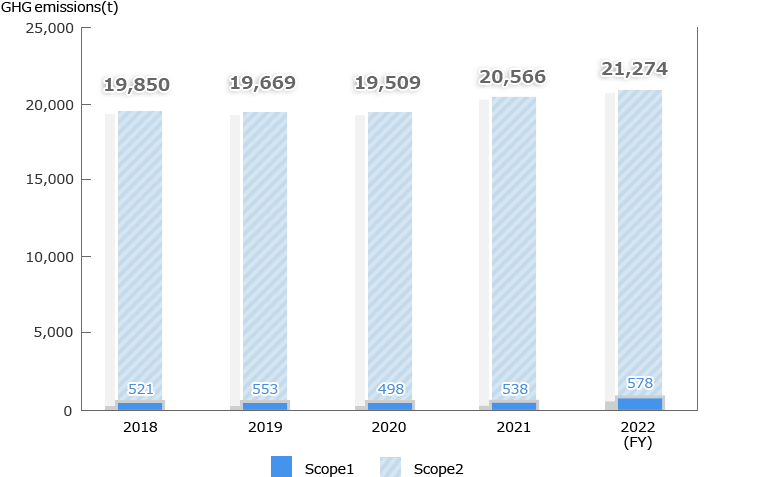
| GHG emissions | Unit | FY2018 | FY2019 | FY2020 | FY2021 | FY2022 | Included range |
|---|---|---|---|---|---|---|---|
| Scope1 | t-CO2 | 521 | 553 | 498 | 538 | 578 | Consolidated |
| Scope2 | t-CO2 | 19,850 | 19,669 | 19,509 | 20,566 | 21,274 | Consolidated |
| Total GHG emissions | t-CO2 | 20,371 | 20,222 | 20,007 | 30,001*2 | 380,456*3 | Consolidated |
*2 The total GHG emissions in FY2021 include Scope3 : 8,897 t-GHG.
*3 The total GHG emissions in FY2022 include Scope3 : 358,603 t-GHG.
- Management of Chemical Substances
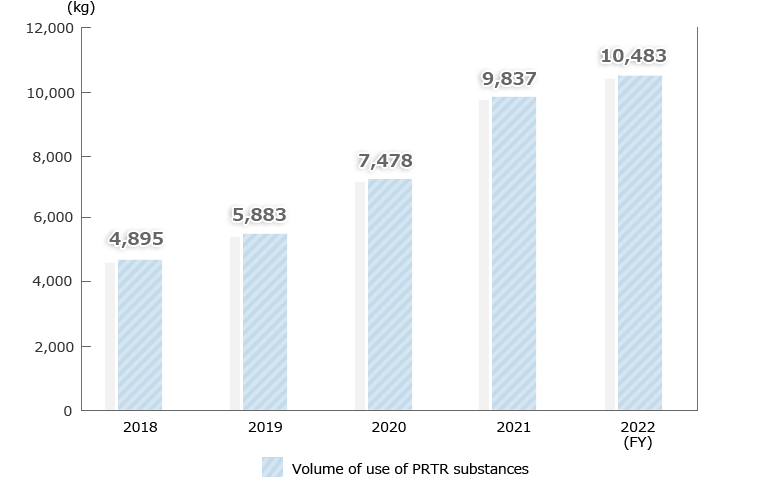
| Managing chemical substance | Unit | FY2018 | FY2019 | FY2020 | FY2021 | FY2022 | Included range |
|---|---|---|---|---|---|---|---|
| Volume of use of PRTR substances | kg | 4,895 | 5,883 | 7,478 | 9,837 | 10,483 | Consolidated (domestic) |
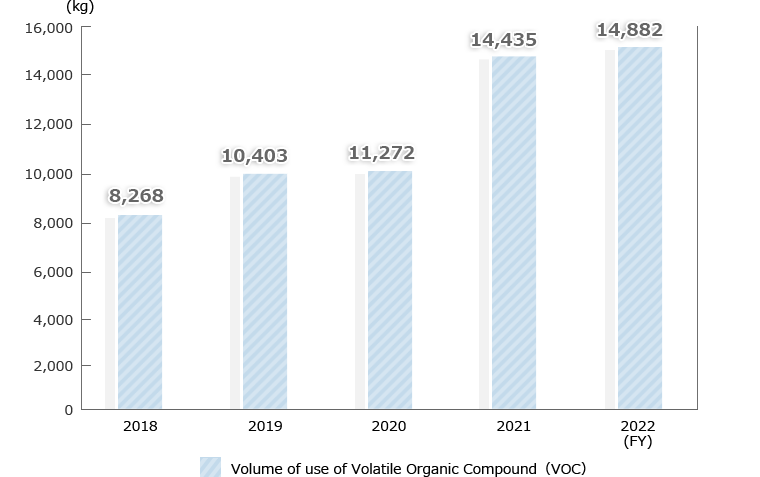
| Managing chemical substance | Unit | FY2018 | FY2019 | FY2020 | FY2021 | FY2022 | Included range |
|---|---|---|---|---|---|---|---|
| Volume of use of Volatile Organic Compound(VOC) | kg | 8,268 | 10,403 | 11,272 | 14,435 | 14,882 | Consolidated (domestic) |
Major Initiatives
Introduction of Renewable Energy Sources
The Yokowo Group is seeking to realize proposed plans for the introduction of renewable energy sources at its plants in Japan (Tomioka, Gunma), China, Vietnam and Malaysia, aiming for direct reduction in greenhouse gas (GHG) emissions. In October 2022, the Group took advantage of the Ministry of the Environment's Joint Crediting Mechanism and installed a photovoltaic power generation system at its plant in Vietnam.
The Photovoltaic Power Generation System at Vietnam Plant
The power output of the photovoltaic power generation system installed at the plant in Vietnam is 1.24MW, and total annual energy production will be approximately 1.34 million kWh. From now on, 27% of the energy used at the plant in Vietnam will be renewable energy derived from solar, enabling the Group to reduce its CO2 emissions by approximately 445 tons per year and approximately 8,900 tons over 20 years. Through this initiative, the Group will contribute to achievement of the greenhouse gas emission reduction target.
